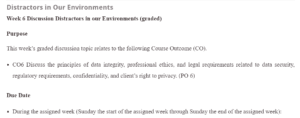Distractors in Our Environments
Healthcare settings can be time-constrained, demanding, and hectic environments. In these environments, the healthcare staff performs several complex cognitive tasks that call for their undivided attention. Constant beeping goes on from feeding pumps, vital signs machines, ventilators, bed monitors, and medication pumps, which are alarms that nurses and other staff are familiar with and more so in intensive care units. These multiple sources of beeping can be a source of distraction in addition to other distractions from phone calls, equipment failure, colleagues, and phones, among others, and are a major cause of concern as they impact the health outcomes of patients (Hebda et al., 2019). Research shows that 72-99% of all alarms are false, thus leading to alarm fatigue. On the downside, because of the high number of false alarms, alarms that genuinely alert physicians and nurses of impending danger to the patient’s health go unnoticed and are often ignored. If an alarm is ignored, the chances of it being false and also being genuine are equal. If an alarm is ignored and later turns out it was genuine, then the patient’s health is at risk. In one tragic case, a cardiac patient died after his alarm blared for two hours, alerting the staff of 19 dangerous arrhythmias (Ruski & Hueske-Kraus, 2015). Deaths because of the genuine alarms yet ignored can be catastrophic to the patients, which, in turn, can have serious legal repercussions, including lawsuits and hefty sums paid out to the patient or the kin. Our assignment writing services will allow you to attend to more important tasks as our experts handle your task. Get in touch with us at eminencepapers.com.
The ethical issues that are defiled in this case are non-maleficence and beneficence. In the last several years, research has shown that the following statistics linked to alarm fatigue following false alarms: a pediatric hospital reported approximately 5,300 alarms in a single day, of which 95 percent were false; a healthcare facility reported over 1 million alarms in a single week; a hospital reported an average of 350 alarms per patient in any given day in the ICU; between 2009-2012, the US hospitals reported 13 severe injuries and more than 80 deaths; the FDA reported that over 560 deaths related to alarms in the US were reported between 2005-2008.
References
Hebda, T., Hunter, K., & Czar, P. (2019). Handbook of informatics for nurses & healthcare professionals (6th ed.).
Ruskin, K. J., & Hueske-Kraus, D. (2015). Alarm fatigue: impacts on patient safety. Current Opinion in Anesthesiology, 28(6), 685-690.
ORDER A PLAGIARISM-FREE PAPER HERE
We’ll write everything from scratch
Question
Distractors in Our Environments
Week 6 Discussion Distractors in our Environments (graded)
Purpose
This week’s graded discussion topic relates to the following Course Outcome (CO).
- CO6 Discuss the principles of data integrity, professional ethics, and legal requirements related to data security, regulatory requirements, confidentiality, and the client’s right to privacy. (PO 6)
Due Date
- During the assigned week (Sunday the start of the assigned week through Sunday the end of the assigned week):
- Posts in the discussion at least two times, and
- Posts in the discussion on two different days
Points Possible
50 points
Directions

Distractors in Our Environments
- Discussions are designed to promote dialogue between faculty and students, and students and their peers. In discussions students:
- Demonstrate understanding of concepts for the week
- Integrate outside scholarly sources when required
- Engage in meaningful dialogue with classmates and/or instructor
- Express opinions clearly and logically, in a professional manner
- Use the rubric on this page as you compose your answers.
- Best Practices include:
- Participation early in the week is encouraged to stimulate meaningful discussion among classmates and instructors.
- Enter the discussion often during the week to read and learn from posts.
- Select different classmates for your reply each week.
Discussion Question
Distractions are everywhere. They may include cellphones, multiple alarms sounding, overhead paging, monitors beeping, and various interruptions that disrupt your clinical practice.
Give an example of an ethical or legal issue that may arise if a patient has a poor outcome or sentinel event because of a distraction such as alarm fatigue. What does the evidence reveal about alarm fatigue and distractions in healthcare when it comes to patient safety?
Grading
To view the grading criteria/rubric, please click on the 3 dots in the box at the end of the solid gray bar above the discussion board title and then Show Rubric. See Syllabus for Grading Rubric Definitions.

